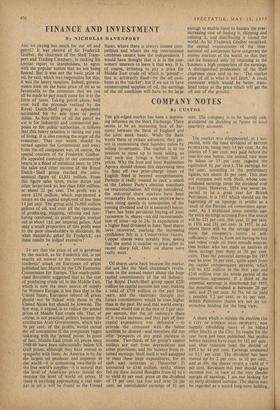COMPANY NOTES
By CUSTOS
THE gilt-edged market has been a depress- ing influence on the Stock Exchange. There seems to be an increasing lack of har- mony between the Bank of England and the joint stock banks. While the Bank wants them to reduce advances, they per- sist in maintaining their liquidity ratios by selling investments. The market is in no position to stand up to bank selling, so that each day brings a further fall in prices. Why the Iron and Steel Realisation Agency should choose this depressing time to float off two prior-charge issues of English Steel is beyond comprehension. Perhaps it really wanted to cock a snook at the Labour Party's election manifesto on renationalisation. All things considered, the industrial share markets have been remarkably firm. MARKS AND SPENCER have been rising quietly in anticipation of the coming dividend and (it is assumed) bonus. There has been persistent buying of JOHN THOMPSON 5s. shares—an old recommenda- tion of mine—up to 24s. in expectation of a higher final dividend in June. Steel shares have recovered, marking the increasing confidence felt in a Conservative victory. Copper shares were notably firm, seeing that the metal is steadier in price after its recent sharp fall. Only oil shares were really weak.
Oil shares came back because the market did not like the Shell chairman's revela- tions in the annual report about the huge capital commitments of the oil industry. The Roiyal Dutch-Shell group spent £220 million bn capital account last year, making a total of £798 million in the past four years, and the chairman thought that future commitments would be even higher than in the past. He said that world energy demand would rise at the rate of 3 per cent. per annum, that the oil industry's share of it would increase, and that part of their capital expenditure was 'defensive' to provide the consumer with the better qualities he desired—and therefore did not offer 'prospects of any great increase in income.' Two-thirds of his group's capital outlays are met from depreciation and other provisions, and the balance from re- tained earnings. Shell itself is well equipped to meet these huge expenditures, for its cash and securities at December 31 amounted to £346 million. SHELL shares fell on these second thoughts from 64 to 6 to yield 44 per cent. gross on the dividend of 15 per cent, tax free and over 24 per cent, on consolidated earnings of 81 per cent. The company is to be warmly con- gratulated on deciding in future to issue quarterly accounts.
* * The market was disappointed, as 1 sus- pected, with the final dividend of BRITISH ria ROLEUM, being only 14 per cent. As the interim of 5 per cent. was paid before the four-for-one bonus, the annual rate must be taken as 15 per cent. (against the equivalent 84 per cent.). The earnings for the year, according to the preliminary figures, are about 30 per cent. This does not compare well with Shell, whose con- solidated earnings cover the dividend over five times. However, 1954 was never ex- pected to be a great year for British Petroleum. It is 1955 which should see the beginning of an upsurge in profits as a result of the Persian oil consortium agree- ment. As I explained some months ago. the extra earnings accruing from this source will be 124 per cent. this year, 21 per cent. in 1956 and 264 per cent. in 1957. In ad- dition there will be the savings accruing from the company's return to self- sufficiency—that is, from not having to buy and refine crude oil from outside sources. One broker who has made an analysis of these savings puts them at 30 per cent. extra. Thus the potential earnings for 1955 may be over 70 per Cent., quite apart from the capital compensation payable, which will be £32 million in the first year and £240 million over the whole period of the consortium agreement. If a third of the potential earnings is distributed for 1955. the potential dividend is between 20 per cent. and 25 per cent. At 76s. 6d. to yield a possible 5.2 per cent. or 64 per cent., British Petroleum shares are not an un- attractive holding for the long view.
A share which is outside the election risk is CITY OP LONDON REAL PROPERTY, HOW happily rebuilding many of its blitzed office blocks in the City. Its results for the year have just been published. Net profits before taxation have risen by 161 per cent.. and after taxation (and the demise of EPL) by 44 per cent. Earnings amounted to 11.1 per cent. The dividend has been moved up by 2 per cent. to 10 per cent.. and at 40s. the shares return a yield of 5 per cent. Revenues this year should again increase but, in view of the very slender margin of earnings, I am not looking for an early dividend increase. The shares may be regarded as a sound long-term holding.


































 Previous page
Previous page